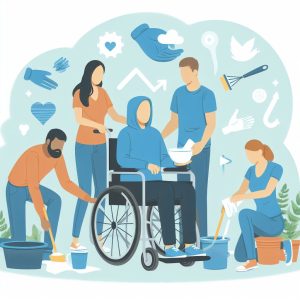 Some months ago Mitchell’s father was asked on LinkedIn🔗 to explain what it is we do to provide for him. What follows is the first of two articles written to answer that question. The second article will follow soon. They are republished here for those not on LinkedIn.
Some months ago Mitchell’s father was asked on LinkedIn🔗 to explain what it is we do to provide for him. What follows is the first of two articles written to answer that question. The second article will follow soon. They are republished here for those not on LinkedIn.
A recent Reasonable and Necessary podcast🔗 by Dr George Taleporos🔗 featured an interview with the NDIS Provider and Worker Registration Taskforce. A service delivery model called service-for-one was mentioned.
Given the interest expressed by a few people, I intend to write a series of articles about this service-for-one care model. I’m going to start by explaining what service-for-one is.
A service-for-one means that you employ staff directly to support a person with disability [using their NDIS funding]. You can do this as a family, an individual or with other important people in the person’s life.
## See end of article for an update on the above paragraph ##
Often services-for-one are set up by families to provide support for people with complex behaviour support needs. This may be the best solution when other service models have not worked or are not available.
Inclusion Australia🔗 put together information about service-for-one. Please note that this material was funded by the NDIS Quality and Safeguards Commission and has a regulatory vibe. Bottom line, if you do not have restrictive practices in place you don’t need to involve a registered provider.
Service-for-one is one of a number of service models that fit under the family governance umbrella. Disability Services Consulting🔗 published an informative post on this topic🔗 back in 2022. In a nutshell, a family governance model puts the individual, and where necessary their family, in charge to the maximum extent possible. If you do a little googling you will uncover a lot of informative content on using a family governance model. Just ask if you want some pointers.
Contrary to conventional thought, you don’t have to be a company to deliver a service-for-one. My wife and I aren’t. Federal law views work performed this way as similar to, say, hiring a nanny. We are employing people to do work of a domestic or private nature – caring for our profoundly disabled son.
There are issues you need to be aware of, and manage, with this approach. My wife and I are employers. We have the same obligations as other employers to provide a safe working environment for the people we employ. On the plus side, the reporting obligations are lighter and things like WorkCover are a fraction of typical costs.
So, how did we set up our son’s service for one? Simple, we had help!
A service-for-one can be considered an innovation but really has been around for well over a decade. There are a few service providers in the NDIS market whose focus in on mentoring and coaching people with disability and their families, helping them put their service-for-one in place. The service provider we went to🔗 helps us with payroll and bookkeeping, understanding the Award, recruitment, managing the support team.
We get to draw on the cumulative expertise built from the people and families who travelled this path before us. We get to stand on the shoulders of giants🔗!
##UPDATE##
I have a particular circle of friends who, like our family, have an adult child with profound disability. We support and encourage each other on life’s journey. We all have similar care arrangements. Several of those friends prompted me to reconsider how a service-for-one should be defined.
We all personally select support workers. We are all very hands-on with their training, and supervise and direct the care they provide. While my family employs these workers directly, not everyone does. Others use small, specialised platform providers—similar to HireUp and Mable but on a much smaller scale. This alleviates some of the administrative responsibilities, such as payroll and superannuation. I am now of the view these families also deliver a ‘service-for-one’ for their adult children. Upon reflection, it seems somewhat arbitrary to base the definition of service-for-one on the method of worker engagement rather than on the focus and delivery of the actual service.
I have left the original wording in my post because it is used by Inclusion Australia in their service-for-one project website. That said, I believe another quote from that website provides a more inclusive definition of service-for-one.
Many people with disability across Australia are supported in individual arrangements that have been set up by their family and other supports to best meet their needs. This includes employing support workers and other supports directly, using funding from the person’s NDIS plan. These arrangements can be called services-for-one.